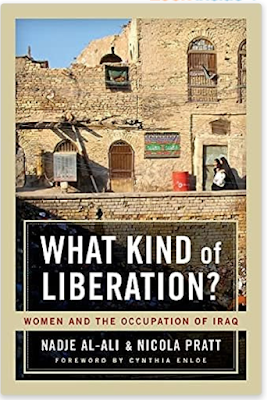Al-Ali, Nadje and Pratt, Nicola, What Kind of Liberation? Women and the Occupation of Iraq, Berkeley, Los Angeles, London: University of California Press, 2009
What Kind of Liberation? Women and the Occupation of Iraq by Nadje Al-Ali and Nicola Pratt argues that Iraqi women were worse off after the 2003 invasion. It covers a myriad of issues they faced during the U.S. occupation such as violence, being targeted by religious groups, and marginalization by the new political system. The book is inconsistent and a bit dated. For all the information about how difficult it was for women in post-Saddam Iraq it goes into all kinds of women’s organizations that may not even be around today. Still it’s a worthwhile read because there are so few books on women’s issues in Iraq.
Ali and Pratt do a good job proving their thesis that the removal of Saddam Hussein did not liberate women. After 2003 women were the victims of violence by not only armed groups but husbands and family members. The former made it hard to organize and operate in the new Iraq because many people were scared to leave their homes during the civil war period. Religious groups targeted women to make an example out of them for how they wanted to reshape society. That led to demands that women wear hijabs and be segregated in public spaces. The new ethnosectarian political system that was created marginalized women. While females had quotas which led to a large number of them being elected to parliament they were beholden to the party bosses that picked them. Those parties were more interested in their squabbles with their rivals than women’s issues. These are all good points and explain how women went from one bad situation under Baathist rule to another under the U.S. occupation. Women have also been a neglected topic in discussing Iraq with most writers focusing upon American policy or the insurgency. What Kind of Liberation? fills a gaping hole in Iraqi scholarship.
The problem is that the authors spent a lot of pages talking about all the women’s organizations that they met during their research from 2004-2007. They name dozens of groups that were formed, their platforms, their organizing, and funding. The book goes through how it was hard to get to raise money and the problems that came with getting aid from international organizations or the U.S. A major problem with this is that many of the groups discussed may not exist today. All those sections therefore are very dated and get caught up in the minutia of different NGOs.
What Kind of Liberation? is still an important read because so few have written about Iraqi women. It makes a good argument about all the problems they faced after the 2003 invasion from violence to domestic issues to politics. Still not all of the chapters are of equal value. The book is not that long so the inconsistency in the subject matter won’t lead to readers getting bogged down.
Link to all of Musings On Iraq’s book reviews listed by topic





No comments:
Post a Comment